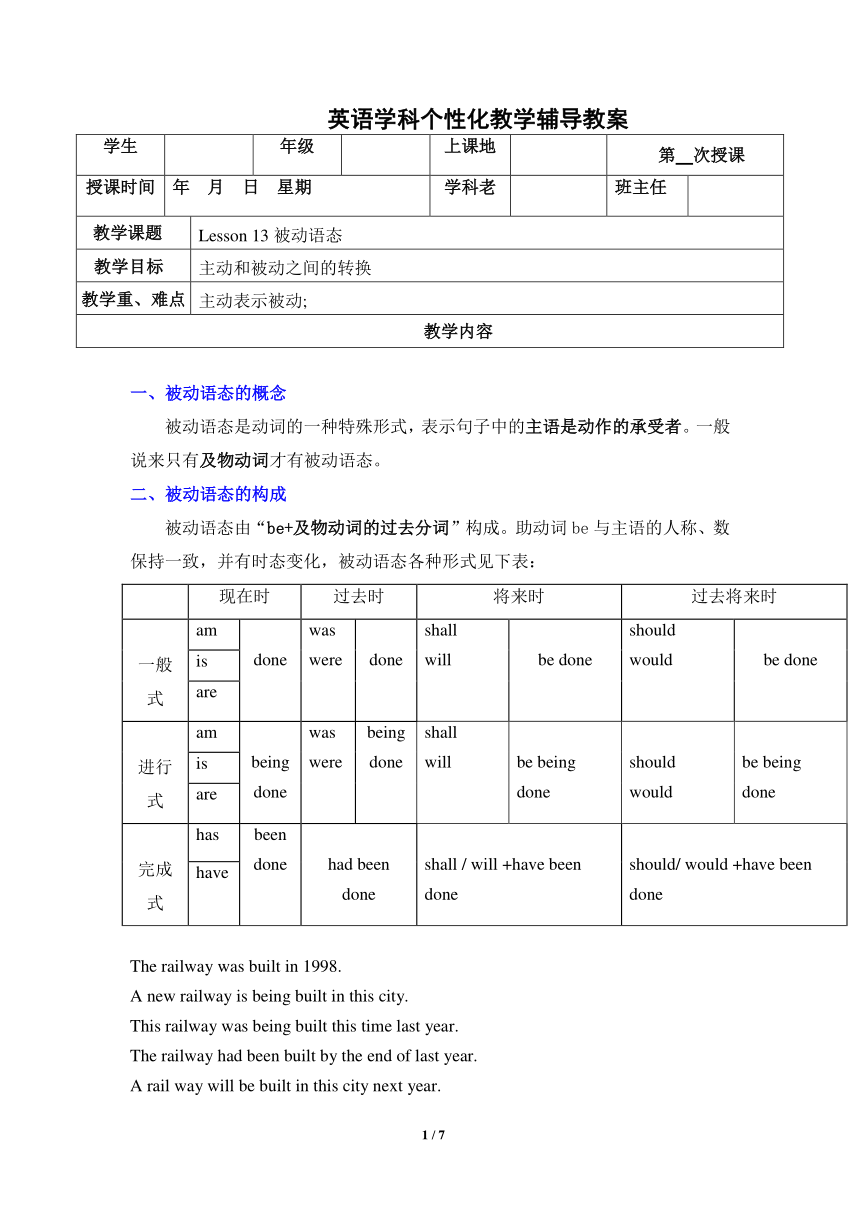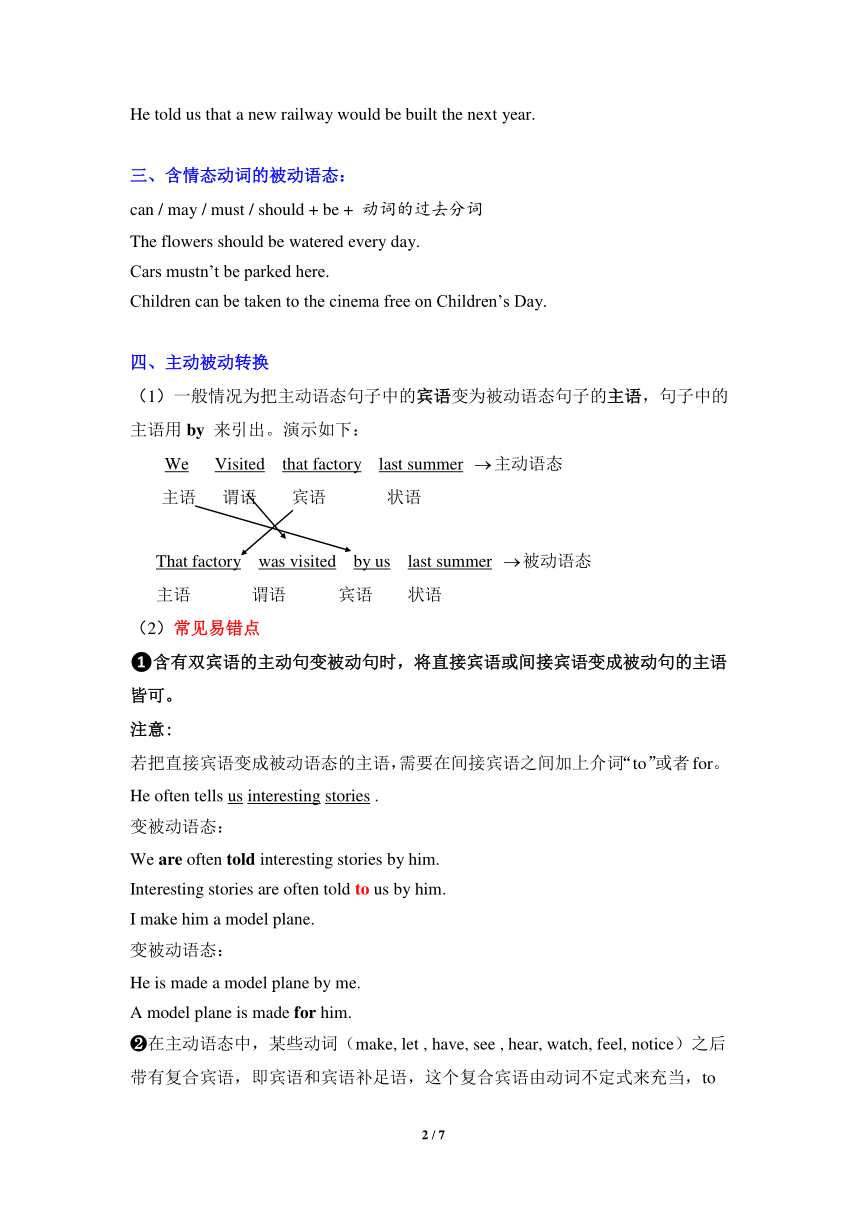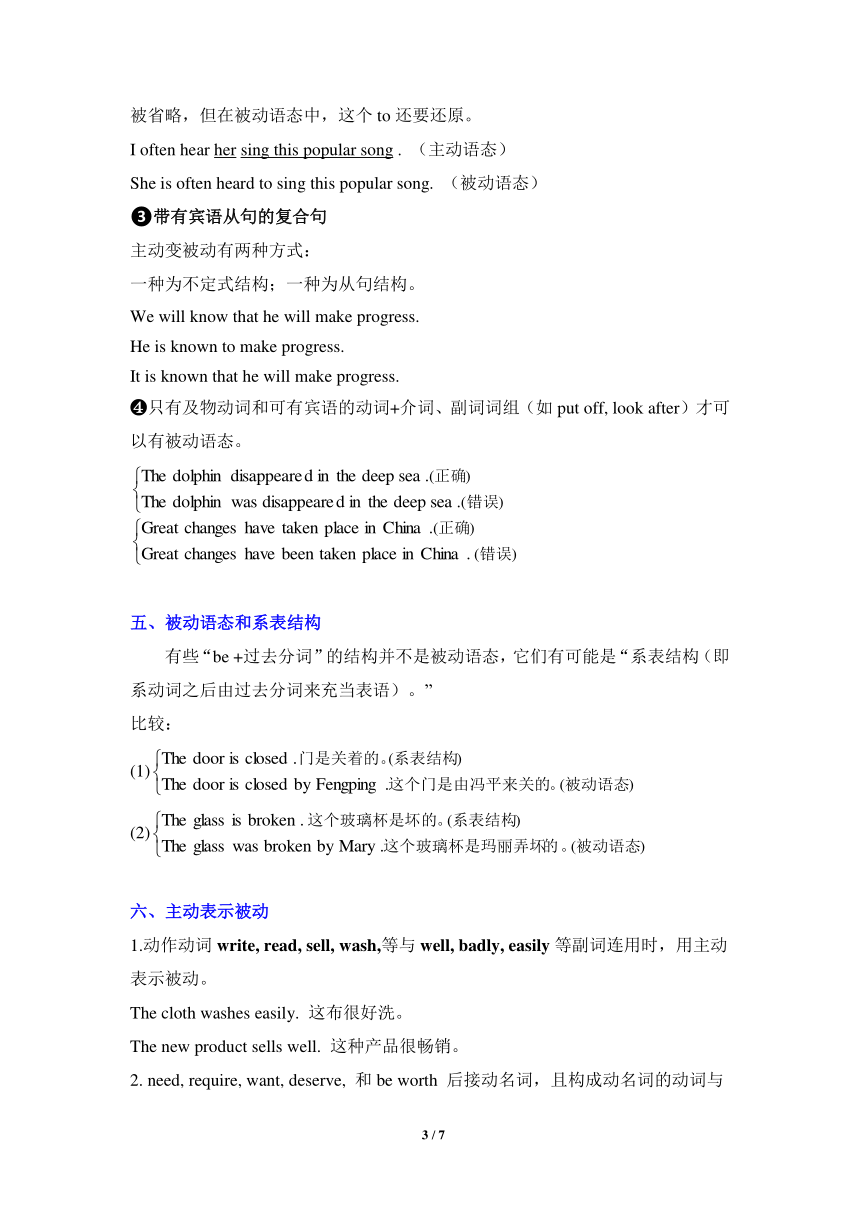2022年中考英语语法专题-第13讲语态
文档属性
| 名称 | 2022年中考英语语法专题-第13讲语态 |

|
|
| 格式 | docx | ||
| 文件大小 | 50.1KB | ||
| 资源类型 | 教案 | ||
| 版本资源 | 通用版 | ||
| 科目 | 英语 | ||
| 更新时间 | 2022-01-18 00:00:00 | ||
图片预览



文档简介
英语学科个性化教学辅导教案
学生 年级 上课地点 第 次授课
授课时间 年 月 日 星期 学科老师 班主任
教学课题 Lesson 13被动语态
教学目标 主动和被动之间的转换
教学重、难点 主动表示被动;
教学内容
一、被动语态的概念
被动语态是动词的一种特殊形式,表示句子中的主语是动作的承受者。一般说来只有及物动词才有被动语态。
二、被动语态的构成
被动语态由“be+及物动词的过去分词”构成。助动词be与主语的人称、数保持一致,并有时态变化,被动语态各种形式见下表:
现在时 过去时 将来时 过去将来时
一般式 am
done was were
done shall will
be done should would
be done
is
are
进行式 am
being done was were being done shall
will
be being done
should would
be being done
is
are
完成式 has been done had been done
shall / will +have been done
should/ would +have been done
have
The railway was built in 1998.
A new railway is being built in this city.
This railway was being built this time last year.
The railway had been built by the end of last year.
A rail way will be built in this city next year.
He told us that a new railway would be built the next year.
三、含情态动词的被动语态:
can / may / must / should + be + 动词的过去分词
The flowers should be watered every day.
Cars mustn’t be parked here.
Children can be taken to the cinema free on Children’s Day.
四、主动被动转换
(1)一般情况为把主动语态句子中的宾语变为被动语态句子的主语,句子中的主语用by 来引出。演示如下:
We Visited that factory last summer 主动语态
主语 谓语 宾语 状语
That factory was visited by us last summer 被动语态
主语 谓语 宾语 状语
(2)常见易错点
含有双宾语的主动句变被动句时,将直接宾语或间接宾语变成被动句的主语皆可。
注意:
若把直接宾语变成被动语态的主语,需要在间接宾语之间加上介词“to”或者for。
He often tells us interesting stories .
变被动语态:
We are often told interesting stories by him.
Interesting stories are often told to us by him.
I make him a model plane.
变被动语态:
He is made a model plane by me.
A model plane is made for him.
在主动语态中,某些动词(make, let , have, see , hear, watch, feel, notice)之后带有复合宾语,即宾语和宾语补足语,这个复合宾语由动词不定式来充当,to被省略,但在被动语态中,这个to还要还原。
I often hear her sing this popular song . (主动语态)
She is often heard to sing this popular song. (被动语态)
带有宾语从句的复合句
主动变被动有两种方式:
一种为不定式结构;一种为从句结构。
We will know that he will make progress.
He is known to make progress.
It is known that he will make progress.
只有及物动词和可有宾语的动词+介词、副词词组(如put off, look after)才可以有被动语态。
五、被动语态和系表结构
有些“be +过去分词”的结构并不是被动语态,它们有可能是“系表结构(即系动词之后由过去分词来充当表语)。”
比较:
(1)
(2)
六、主动表示被动
1.动作动词write, read, sell, wash,等与well, badly, easily等副词连用时,用主动表示被动。
The cloth washes easily. 这布很好洗。
The new product sells well. 这种产品很畅销。
2. need, require, want, deserve, 和be worth 后接动名词,且构成动名词的动词与主语为动宾关系时,动名词用主动表示被动意义。
My watch doesn’t work; it needs repairing.
The film is really worth seeing.
3. 系动词feel, look, seem, taste, sound, remain等后接形容词做表语时用主动表被动。
Your advice sounds practical.
The food taste delicious.
4.在“主+系+表语(形容词)+( for sb.)to do”, 结构中,do与句子的主语为动宾关系,且形容词表示主语的特征或性质,不定式用主动表示被动。该结构常用形容词为:easy, difficult, important, impossible, heavy等。
The question is easy to answer.
Do you think the water is safe to drink
七、补充讲解:
没有被动语态的动词
除不及物动词无被动语态外,有另外六类动词无被动语态:
1.某些表示静态的及物动词:
have,fit,lack,resemble(像),suit,hold(容纳),cost,suffer,last(持续)等。
He has a good car. (不说:A good car is had…)他有一辆好汽车。
They were having a bath then. (不说:A bath was being had…)那时他们正在洗澡。
The shoes don’t fit me. (不说:I’m not fitted by…)这双鞋不合适我。
He resembles his father. (不说:His father is resembled by…)他长得像他父亲。
The shirt suits me well. (不说:I’m suited by…)这衬衫很合我身。
The room can hold 500 people. (不说:500 people can be held by…)这房间能容纳500个人。
The book cost me five dollars. (不说:I was cost five dollars by…)这本书花了我5美元。
They suffered heavy losses. (不说:They were suffered…)他们损失惨重。
2.某些由及物动词转变的自动词:
这些动词有人称之为主动形式,被动意义,也有人称之为自动词。顾名思义,自动词是说动词的动作是由主语自身所产生的。既然是主语自身产生的动作,就根本不存在被动语态了。这类动词常见的有:
promise (有指望), sell, wash, write, wear, read, break out, run out, give out, add up to, take place, turn out (证实), catch (挂住) 等。
The game promises to be an exciting one. (不说:…is promised…)预计这是一场令人激动的比赛。
The goods sell well. (不说:…are sold…)这些商品畅销。
The clothes wash well. (不说:…are washed…)这些衣服好洗。
My pen writes smoothly. (不说:…is written…)我的钢笔好使。
Your article reads easily. (不说:…is read…)你的文章好读。
The Second World War broke out in 1939. (不说:…was broken…)第二次世界大战于1939年爆发。
My ink has run out. (不说:…has been run…)我的钢笔水用完了。
My gases gave out. (不说:…was given out…)我的汽油用光了。
His whole school education added up to no more than one year. (不说:…was added up to…)他的全部学校教育加起来不到一年。
It turned out that he was right. (不说:It was turned…)已证实他对。
This turned out to be a great help to the workers. (不说:…was turned…)结果证实对工人有好处。
My foot caught on a stone. (不说:…was caught…)我的脚被石头绊了一下。
The kite caught in a tree. (不说:…was caught…)风筝被树挂住了。
如果这些动词作及物动词用,就用被动语态。
The goods are sold out. 货物卖光了。
The clothes have been worn out already. 衣服已穿破了。
Many books have been turned out this year. 今年出版了许多书。
He was caught stealing. 他偷窃被抓住。
Another sentence has been added to the article. 这篇文章又加了一句话。
3.系动词:
有些动词自身就是系动词,有些系动词是由实意动词演变而来的。
She appears to be friendly. 她看上去友好。
He seemed to have known it already. 他看上去已经知道了此事。
The flowers smell nice. 花闻上去香。
Cotton feels soft. 棉花摸上去软。
He is older than he looks. 他比他看上去老。
The man turned blue with fear. 这人脸吓得发白。
The clothes have worn thin. 衣服已穿薄了。
The shoes wear long. 这鞋耐穿。
4.有些不及物动词加介词可以用被动语态,但有些就不能。
agree with,arrive at (到达),get to (到达),look into,walk into
Every one agreed with me. (不说:I was agreed with by…)
They arrived at the village. (不说:The village was arrived at…)
They got to the station. (不说:The station was got to…)
(下面句子词义变了,故可以用被动语态。)试比较:
The arrangement hasn’t been agreed upon. 安排尚未达成协议。
The conclusion has not been arrived at. 结论还没得出。
The matter will be looked into. 此事将被调查。
5.动词leave (离开),enter (加入,进入),join(参加)不可用被动语态。
He left his house. (不说:His house was left. )他离开他的家。
He entered the room. (不说:The room was entered. )他进屋了。
He joined the Party. (不说:The Party was joined by him. )他入党了。
6. 当宾语是动名词、反身代词和同源宾语时,无被动语态。例如:
2 / 2
学生 年级 上课地点 第 次授课
授课时间 年 月 日 星期 学科老师 班主任
教学课题 Lesson 13被动语态
教学目标 主动和被动之间的转换
教学重、难点 主动表示被动;
教学内容
一、被动语态的概念
被动语态是动词的一种特殊形式,表示句子中的主语是动作的承受者。一般说来只有及物动词才有被动语态。
二、被动语态的构成
被动语态由“be+及物动词的过去分词”构成。助动词be与主语的人称、数保持一致,并有时态变化,被动语态各种形式见下表:
现在时 过去时 将来时 过去将来时
一般式 am
done was were
done shall will
be done should would
be done
is
are
进行式 am
being done was were being done shall
will
be being done
should would
be being done
is
are
完成式 has been done had been done
shall / will +have been done
should/ would +have been done
have
The railway was built in 1998.
A new railway is being built in this city.
This railway was being built this time last year.
The railway had been built by the end of last year.
A rail way will be built in this city next year.
He told us that a new railway would be built the next year.
三、含情态动词的被动语态:
can / may / must / should + be + 动词的过去分词
The flowers should be watered every day.
Cars mustn’t be parked here.
Children can be taken to the cinema free on Children’s Day.
四、主动被动转换
(1)一般情况为把主动语态句子中的宾语变为被动语态句子的主语,句子中的主语用by 来引出。演示如下:
We Visited that factory last summer 主动语态
主语 谓语 宾语 状语
That factory was visited by us last summer 被动语态
主语 谓语 宾语 状语
(2)常见易错点
含有双宾语的主动句变被动句时,将直接宾语或间接宾语变成被动句的主语皆可。
注意:
若把直接宾语变成被动语态的主语,需要在间接宾语之间加上介词“to”或者for。
He often tells us interesting stories .
变被动语态:
We are often told interesting stories by him.
Interesting stories are often told to us by him.
I make him a model plane.
变被动语态:
He is made a model plane by me.
A model plane is made for him.
在主动语态中,某些动词(make, let , have, see , hear, watch, feel, notice)之后带有复合宾语,即宾语和宾语补足语,这个复合宾语由动词不定式来充当,to被省略,但在被动语态中,这个to还要还原。
I often hear her sing this popular song . (主动语态)
She is often heard to sing this popular song. (被动语态)
带有宾语从句的复合句
主动变被动有两种方式:
一种为不定式结构;一种为从句结构。
We will know that he will make progress.
He is known to make progress.
It is known that he will make progress.
只有及物动词和可有宾语的动词+介词、副词词组(如put off, look after)才可以有被动语态。
五、被动语态和系表结构
有些“be +过去分词”的结构并不是被动语态,它们有可能是“系表结构(即系动词之后由过去分词来充当表语)。”
比较:
(1)
(2)
六、主动表示被动
1.动作动词write, read, sell, wash,等与well, badly, easily等副词连用时,用主动表示被动。
The cloth washes easily. 这布很好洗。
The new product sells well. 这种产品很畅销。
2. need, require, want, deserve, 和be worth 后接动名词,且构成动名词的动词与主语为动宾关系时,动名词用主动表示被动意义。
My watch doesn’t work; it needs repairing.
The film is really worth seeing.
3. 系动词feel, look, seem, taste, sound, remain等后接形容词做表语时用主动表被动。
Your advice sounds practical.
The food taste delicious.
4.在“主+系+表语(形容词)+( for sb.)to do”, 结构中,do与句子的主语为动宾关系,且形容词表示主语的特征或性质,不定式用主动表示被动。该结构常用形容词为:easy, difficult, important, impossible, heavy等。
The question is easy to answer.
Do you think the water is safe to drink
七、补充讲解:
没有被动语态的动词
除不及物动词无被动语态外,有另外六类动词无被动语态:
1.某些表示静态的及物动词:
have,fit,lack,resemble(像),suit,hold(容纳),cost,suffer,last(持续)等。
He has a good car. (不说:A good car is had…)他有一辆好汽车。
They were having a bath then. (不说:A bath was being had…)那时他们正在洗澡。
The shoes don’t fit me. (不说:I’m not fitted by…)这双鞋不合适我。
He resembles his father. (不说:His father is resembled by…)他长得像他父亲。
The shirt suits me well. (不说:I’m suited by…)这衬衫很合我身。
The room can hold 500 people. (不说:500 people can be held by…)这房间能容纳500个人。
The book cost me five dollars. (不说:I was cost five dollars by…)这本书花了我5美元。
They suffered heavy losses. (不说:They were suffered…)他们损失惨重。
2.某些由及物动词转变的自动词:
这些动词有人称之为主动形式,被动意义,也有人称之为自动词。顾名思义,自动词是说动词的动作是由主语自身所产生的。既然是主语自身产生的动作,就根本不存在被动语态了。这类动词常见的有:
promise (有指望), sell, wash, write, wear, read, break out, run out, give out, add up to, take place, turn out (证实), catch (挂住) 等。
The game promises to be an exciting one. (不说:…is promised…)预计这是一场令人激动的比赛。
The goods sell well. (不说:…are sold…)这些商品畅销。
The clothes wash well. (不说:…are washed…)这些衣服好洗。
My pen writes smoothly. (不说:…is written…)我的钢笔好使。
Your article reads easily. (不说:…is read…)你的文章好读。
The Second World War broke out in 1939. (不说:…was broken…)第二次世界大战于1939年爆发。
My ink has run out. (不说:…has been run…)我的钢笔水用完了。
My gases gave out. (不说:…was given out…)我的汽油用光了。
His whole school education added up to no more than one year. (不说:…was added up to…)他的全部学校教育加起来不到一年。
It turned out that he was right. (不说:It was turned…)已证实他对。
This turned out to be a great help to the workers. (不说:…was turned…)结果证实对工人有好处。
My foot caught on a stone. (不说:…was caught…)我的脚被石头绊了一下。
The kite caught in a tree. (不说:…was caught…)风筝被树挂住了。
如果这些动词作及物动词用,就用被动语态。
The goods are sold out. 货物卖光了。
The clothes have been worn out already. 衣服已穿破了。
Many books have been turned out this year. 今年出版了许多书。
He was caught stealing. 他偷窃被抓住。
Another sentence has been added to the article. 这篇文章又加了一句话。
3.系动词:
有些动词自身就是系动词,有些系动词是由实意动词演变而来的。
She appears to be friendly. 她看上去友好。
He seemed to have known it already. 他看上去已经知道了此事。
The flowers smell nice. 花闻上去香。
Cotton feels soft. 棉花摸上去软。
He is older than he looks. 他比他看上去老。
The man turned blue with fear. 这人脸吓得发白。
The clothes have worn thin. 衣服已穿薄了。
The shoes wear long. 这鞋耐穿。
4.有些不及物动词加介词可以用被动语态,但有些就不能。
agree with,arrive at (到达),get to (到达),look into,walk into
Every one agreed with me. (不说:I was agreed with by…)
They arrived at the village. (不说:The village was arrived at…)
They got to the station. (不说:The station was got to…)
(下面句子词义变了,故可以用被动语态。)试比较:
The arrangement hasn’t been agreed upon. 安排尚未达成协议。
The conclusion has not been arrived at. 结论还没得出。
The matter will be looked into. 此事将被调查。
5.动词leave (离开),enter (加入,进入),join(参加)不可用被动语态。
He left his house. (不说:His house was left. )他离开他的家。
He entered the room. (不说:The room was entered. )他进屋了。
He joined the Party. (不说:The Party was joined by him. )他入党了。
6. 当宾语是动名词、反身代词和同源宾语时,无被动语态。例如:
2 / 2
同课章节目录
- 词法
- 名词
- 动词和动词短语
- 动词语态
- 动词时态
- 助动词和情态动词
- 非谓语动词
- 冠词
- 代词
- 数词和量词
- 形容词副词及其比较等级
- 介词和介词短语
- 连词和感叹词
- 构词法
- 相似、相近词比较
- 句法
- 陈述句
- 一般疑问句和否定疑问句
- 特殊疑问句及选择疑问句
- 反意疑问句
- 存在句(There be句型)
- 宾语从句
- 定语从句
- 状语从句
- 主谓一致问题
- 简单句
- 并列句
- 复合句
- 主谓一致
- 主、表语从句
- 名词性从句
- 直接引语和间接引语
- 虚拟语气
- 感叹句
- 强调句
- 倒装句
- 祈使句
- 句子的成分
- 句子的分类
- 题型专区
- 单项选择部分
- 易错题
- 完形填空
- 阅读理解
- 词汇练习
- 听说训练
- 句型转换
- 补全对话
- 短文改错
- 翻译
- 书面表达
- 任务型阅读
- 语法填空
- 其他资料
